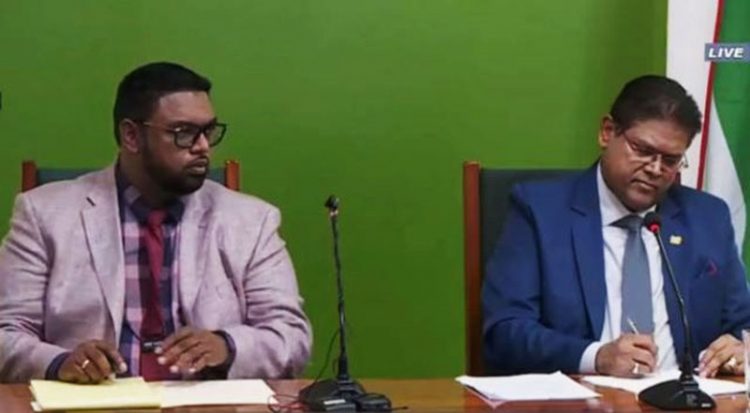With the drift of hemispheric oil and gas engagements seemingly moving in the direction of enhanced cooperation involving Guyana, Suriname and Brazil, the government here announced earlier this week that President Irfaan Ali was due to pay a visit to Paramaribo yesterday where he was expected to meet with Surinamese President Chandrikapersad Santokhi, and Brazil’s President Jair Bolsonaro.
The three South American Presidents were slated to hold discussions on, among other things, the creation of an ‘energy corridor’ as well as the likely benefits that they can derive from the creation of opportunities that can derive from their common focus on using their oil and gas resources to develop their respective economies.

The release had said that the meeting in Paramaribo will also allow for the three Presidents to probe other areas of common interest.
Yesterday’s meeting in Paramaribo was scheduled to be followed by a subsequent bilateral meeting today, Friday January 21 between Presidents Ali and Bolsonario and a team of Brazilian officials in Georgetown to engage in discussions that will focus broadly on improving economic relations between Guyana and Brazil in areas that include food security, telecommunications, agriculture, infrastructure integration and the development of a deep water harbor.
Recent breakthroughs in the oil and gas sectors in Guyana and Suriname as well as Brazil’s on expanding its own oil production have meant that the three neighboring countries have now taken more prominent places on the global energy stage even as the traditional hemispheric frontrunner, Venezuela, seeks to respond to challenges that have afflicted its own world-renowned oil and gas industry arising in large measure out of pressures which its oil and gas industry faces on account of US sanctions that continue to affect both the performance of its oil and gas industry at the recovery level as well as its ability to efficiently move its shipments of oil to markets across the world.
Both Guyana and Brazil have been identified as potentially significant major players in the global oil and gas industry, going forward,, even while Brazil has been named by the respected independent energy research and business intelligence company Rystad Energy, alongside Guyana and Norway as countries that are expected to add to global oil supplies this year. Suriname’s seemingly inevitable even imminent major oil recovery successes has already opened up avenues for discussion and practical action in its engagements with Guyana including the commencement of initiatives that have as their objective the bridging of the Corentyne river which separates the two countries.
It is expected that the outcomes of yesterday’s and today’s engagements will be matters of interest for audiences that go beyond audiences in the two countries and extend into the global oil and gas community, as a whole.








